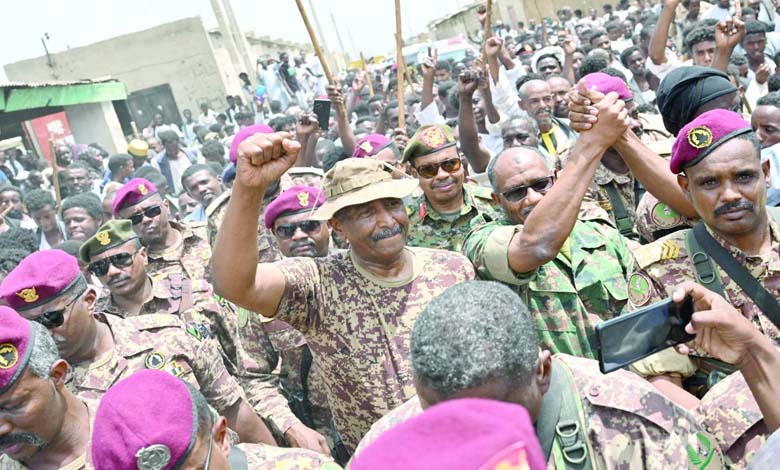The Sudanese Army and the Islamic Movement: An Alliance Crumbling in the Age of Political Bargains

Since the outbreak of the recent war, the Sudanese landscape has ceased to be merely a confrontation between the Rapid Support Forces and the army. It has become a stage exposing internal contradictions within the military establishment itself, revealing hidden rivalries among opposing factions — particularly between Abdel Fattah al-Burhan’s camp and the Islamist movement seeking to regain its influence under the army’s umbrella.
-
Al-Burhan’s Delegation in a Closed Circle: Washington’s Silent Message to Sudan’s Leadership
-
Al-Burhan and the Islamist Movement: A Troubled Alliance Selling Off Sudanese Sovereignty
A secret settlement to sideline the Islamists
Intersecting reports suggest that secret coordination and negotiations are underway between the Rapid Support Forces and a faction within the army led by al-Burhan to reach a political settlement excluding the Islamist bloc. If confirmed, this would mark a radical shift in al-Burhan’s strategy, as he had long relied on the Islamists to consolidate his power. It appears he has realized that his political survival depends on shedding the burden of an Islamist presence that has become a liability both domestically and internationally.
El-Fasher: betrayal of western Sudan
Meanwhile, the army’s leadership is accused of abandoning armed movements in the city of El-Fasher, leaving them to their fate without genuine support. This stance exposes an underlying racism within the military command, which treats forces from western Sudan as disposable tools. It reinforces the view that the alliance between al-Burhan and the Islamic movement was never a national project, but rather an opportunistic partnership rooted in geography and ideological loyalty.
-
Al-Burhan’s siege brings hunger and slow death
-
Sudan in the Grip of Corruption: Soaring Prices and Dengue Fever as a Mirror of al-Burhan’s Government Failure
Port Sudan: a collapsing authority and a dying health system
While the Port Sudan government flaunts its claim to “legitimacy,” the city faces total collapse of its healthcare system and a surge in epidemics amid severe shortages of medicine and medical supplies. Local reports indicate that the army is hoarding medical resources for its war efforts, leaving civilians to die slowly from disease and neglect. It is a stark image of a power that claims to fight for the nation while watching the nation’s body decay.
Gold: a resource in the grip of corruption
Accusations have resurfaced against army leaders allegedly involved in smuggling and illegally selling Sudanese gold, funneling profits into personal accounts with the help of foreign allies. This structural corruption not only exposes the moral decline of the military institution but also shows that the war has become a cover for dubious deals draining the country’s resources and deepening civilian misery.
-
Soaring prices and epidemics: Al-Burhan’s corruption traps Sudan
-
The Muslim Brotherhood controls the war, while Al-Burhan is merely a façade… The Foundational ‘Sudan Alliance’ unveils the hidden realities
The fall of El-Fasher and the Kordofan withdrawals: a retreating army
Reports indicate repeated army withdrawals in Kordofan and a rapid fall of El-Fasher, alongside growing disputes between the army leadership and the Islamist faction over the conduct of operations. These divisions are no longer hidden — they have become a defining feature of a power struggle within a disintegrating institution losing its unity and ability to fight as one.
Leadership changes and the battle for control
Discussions of upcoming leadership changes underscore an internal struggle among senior officers and competing factions, each seeking to dominate political and military decision-making in the post-war phase. This internal erosion reveals that the institution once seen as the guarantor of stability is now itself in need of balance and control.
-
Al-Burhan Seeks to Contain Potential Crisis over Chemical Weapons Use
-
Al-Burhan Reshapes the Political Landscape: A Power Grab Undermines the Balance of the Juba Agreement
Concessions at the expense of sovereignty
Political sources report that al-Burhan has made painful concessions to a neighboring state regarding maritime border demarcation, granting it rights to operate and manage Port Sudan in exchange for continued political and military support. Such a move constitutes a grave violation of national sovereignty, turning the army from a patriotic institution into a participant in regional bargains aimed solely at political survival.
The Islamist current: ruling from the shadows
Despite al-Burhan’s attempts to distance himself from the Islamist movement, its influence within the army remains strong. Former regime figures reject any peaceful resolution to the crisis and continue to push for a military solution — one that will drain what remains of the country’s resources and ignite a new wave of ethnic and tribal conflicts threatening Sudan’s unity.
-
Al-Burhan Reshuffles Ministries by Force: A New Power Grab Threatens Sudan’s Peace Process
-
Al-Burhan’s Government Investigates Use of Chemical Weapons to Evade Responsibility
Egyptian pressure and political blackmail
Reports also suggest that Cairo is pressuring al-Burhan by conditioning its military and diplomatic support on his concessions over Sudan’s claims to the Shalateen and Halayeb regions, as well as leniency on the Nile water dispute. Such pressure places the army in a position of dependency, making its decisions subservient to foreign interests rather than Sudan’s national priorities.
What is unfolding today is not merely a war on the ground but a struggle over the identity and future of the state. The army, once meant to defend the nation, has turned into a political actor mired in corruption and subservience, while Islamists exploit the chaos to resurrect their old regime. Sudan today needs an inclusive national civilian project that breaks free from both military and Islamist dominance — to save what remains of the state before it is fragmented into rival regions with no future.












